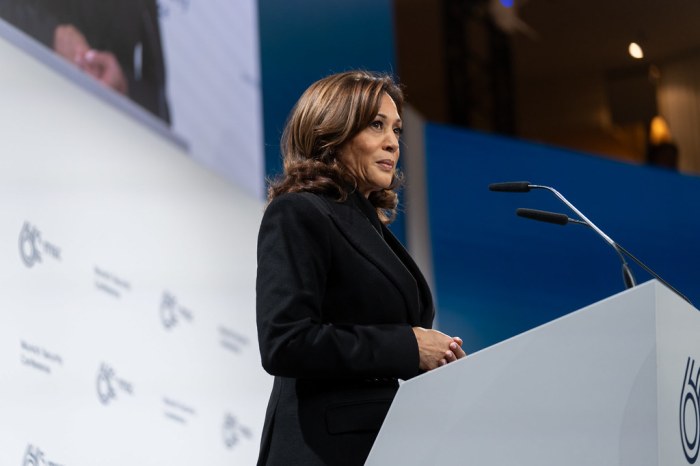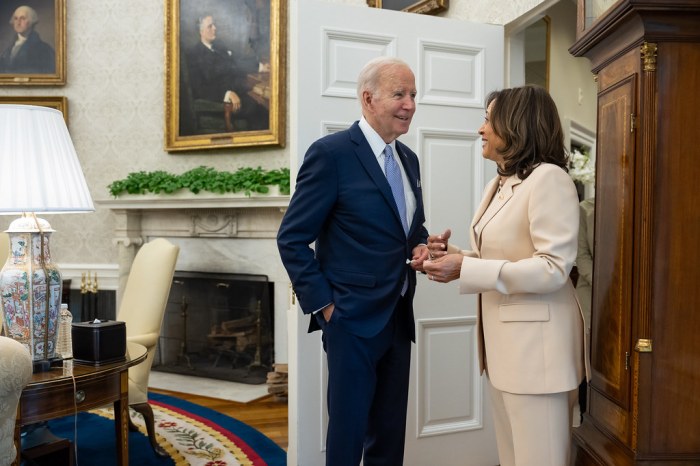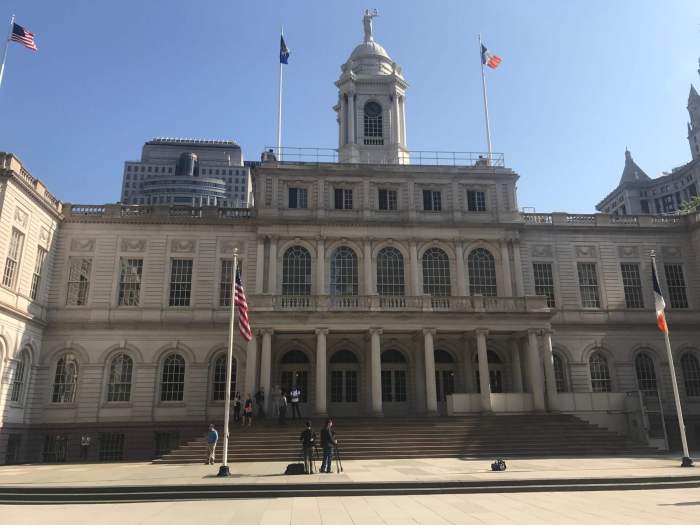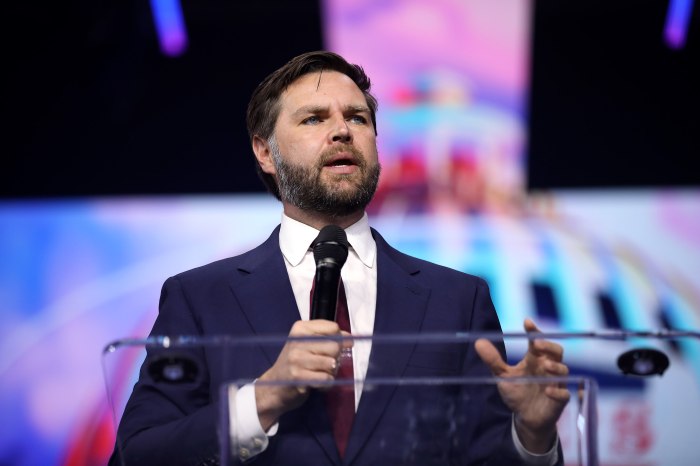Mariela Castro Espín, director of Cuba’s National Center for Sex Education and daughter of Raul Castro, at the New York Public Library. | MICHAEL LUONGO
Perhaps the protective Secret Service agents, golden eagles on their lapels, curly wires leading from their earbuds, represented the political sea change best. In an era of increasing openness between the United States and Cuba, extraordinary steps were being taken to protect the niece of Fidel Castro, a man the US government tried many times to assassinate.
Mariela Castro Espín, the effusive director of Cuba’s National Center for Sex Education (CENESEX) and daughter of Raul Castro, Fidel’s younger brother and Cuba’s current president, was at the New York Public Library to talk about changes of another kind, an increasing Cuban openness on LGBT issues, with herself at the helm.
Castro’s May 29 talk was part of the library’s LGBT programming and came during her first US visit, following a stop in San Francisco. The talk was coordinated with the National Gay and Lesbian Task Force, and its executive director, Rea Carey, moderated, with communications manager Pedro Julio Serrano at times serving as translator. The audience was near capacity –– with well over 100 in attendance –– and filled largely with Latino and progressive supporters of her visit.
Castro spoke almost entirely in Spanish, in a manner that was chatty and personable, at times with a touch of humor. In her introduction, Carey mentioned to Castro “all the emails concerned about your visit” that she had received, adding, “I will try to do the range of views justice.”
One of Carey’s first questions involved how Castro came to lead the LGBT movement in Cuba, and in particular the advances the country has made on transgender issues, with sex reassignment surgery covered under nationalized healthcare. Castro responded by saying, “Gender is a human creation, a mental creation. What we know about sexuality is a mental creation.” She later said, “All of us are transvestites. We take a style that is made up.”
Pedro Julio Serrano, the Task Force's communications manager, and Rea Carey, the group's executive director. | MICHAEL LUONGO
Castro also argued that discrimination against LGBT people in Cuba and other parts of the world is linked to broader forms of discrimination against other disenfranchised groups.
“All forms of discrimination have the same origins,” she said, pointing out that differences within society are exploited in a way that allows those with power to continue saying, “I deserve a little more.” She gave examples throughout history, including slavery, saying, “Any reason justifies that I must have privileges and take something away from you.” To counter that, using an argument that mirrors the case for same-sex marriage in the US, she said, “We are not taking rights from people, we are sharing privileges” when granting equality to LGBT citizens. She later added, “As a heterosexual woman, how can I say to couples they cannot have the same rights?”
On their face, Castro’s comments might seem to conveniently serve the Cuban regime’s critique of inequality and discrimination in capitalist societies, but she did not shy away from looking at her own nation’s problems.
“Cuban society is very resistant to change,” she said, a point made clear in a video she played showing anti-gay hecklers at a Havana Pride event where she spoke.
But the video also indicated how far Cuba appears to have come since 2003, when this reporter visited Cuba for Gay City News. The same locations in Havana’s Vedado neighborhood where gays gathered but risked periodic harassment and arrest by the police then are now sites of LGBT celebration.
“Many professionals and the religious right,” she said, form a sort of upper class that opposes marriage and adoption by same-sex couples, though for divergent reasons. A few years ago, the Communist Party examined Cuban law to systemically remove inherent anti-LGBT discrimination, Castro explained.
Castro said that an apology would be hypocritical.
“It’s not going to change the past,” she said. “What it is about is changing our discrimination” today.
From 1985 through 1993, Cuba created camps for people with HIV, where many gay men were incarcerated. That issue did not come up during Castro's appearance.
Castro spoke of her visit to the GLBT History Museum in San Francisco’s Castro neighborhood, where she was able to see posters of “the fight against all discrimination by the Communist Party in the 1960s in the USA,” making the point that the fight for LGBT equality is a natural fit for Cuba’s political system. With a bit of self-deprecation, she explained how she was surprised to see that such a movement had existed in the United States.
“I loved it because I thought I started this myself, this revolutionary concept of inclusion,” Castro said.
She said that as far back as the 1960s, the Cuban women’s movement was already in favor of LGBT equality, which drew a few incredulous groans from audience members. It is worth remembering, however, that the late Reinaldo Arenas’ memoir “Before Night Falls” recalled that the revolution sparked an initial flowering of sexual liberation before repression set in.
Castro only rarely spoke English, at moments when she seemed to want to make sure a point came across.
“Together, we want to change society and the world,” she said, adding, “LGBT with heterosexuals.”
She and the audience shared good-natured laughs at those moments when she punctuated her remarks by using English.
Castro closed her talk with considerable passion, saying, “We have to fight against all forms of discrimination. We cannot be silent if we see someone else suffering. That was said by [Cuban poet] José Martí and by my uncle, Fidel Castro.” She added, “Is that a dictatorship, fighting all forms of discrimination?”
Castro received a standing ovation, during which she and some members of the audience shouted, “Free the Cuban Five,” a reference to a group of Cubans arrested in 1998 for spying on Miami’s exile community.
This reporter approached Castro, whom he had previously interviewed, but she said, “I am not talking to media. I am sorry.” Much to the seeming chagrin of her protective Secret Service agents, who tried hard to keep people away from her, she accepted flowers and posed for photographs with adoring fans from the audience.
Rosie Mendez, the out lesbian Lower East Side City Council member, and her predecessor, Margarita López, who is also lesbian and now a City Housing Authority commissioner, attended Castro’s talk together, carrying both Puerto Rican and rainbow flags.
City Councilwoman Rosie Mendez and City Housing Authority Commissioner Margarita López show the colors of LGBT pride and their native Puerto Rico. | MICHAEL T. LUONGO
López said that while on the Council, she spoke out against isolating the Cuban people, but that she was also concerned about pressuring their government to do more for its LGBT population. That goal, she said, then seemed elusive.
“Here today, look at what happened,” López said. “You have to push an issue… That’s how the gay community works. When you push, you get your demands answered.”
Mendez was more cautious, saying of Castro’s visit, “It was very interesting, and I am happy I made it in to see her.” She added, “I have not been to Cuba but I am hoping in the near future. I understand there is more sexual freedom, but there are still so many questions,” regarding how open that nation truly is on LGBT issues.
The library’s LGBT Initiative co-chair Carey Maloney explained that he and his partner and co-chair, Hermes Mallea, author of “Great Houses of Havana,” met Castro during one of their many visits to Cuba.
“It was a lot of work to get her here,” Maloney said, particularly in coordinating timing and visa issues.
The Task Force’s Carey acknowledged that a visit by Castro might be a divisive issue among Americans. The Task Force, however, has not “been afraid over 40 years of talking to people that we disagree with on some things and that we agree with on other things,” she explained.
“In some ways, things can be true and untrue at the same time,” she said. Bringing a controversial figure like Castro to talk about LGBT issues is what makes New York’s gay community so vibrant, Carey insisted, saying, “We live in a city where this is possible.”
Editor's note: The original posting of this story incorrectly identified the question about agricultural work camps established in the 1960s for Cubans seen as unfit for military service as focused instead on the camps where people living with HIV were incarcerated beginning in the late 1980s. The HIV camps were not addressed during Castro's Public Library appearance.






































